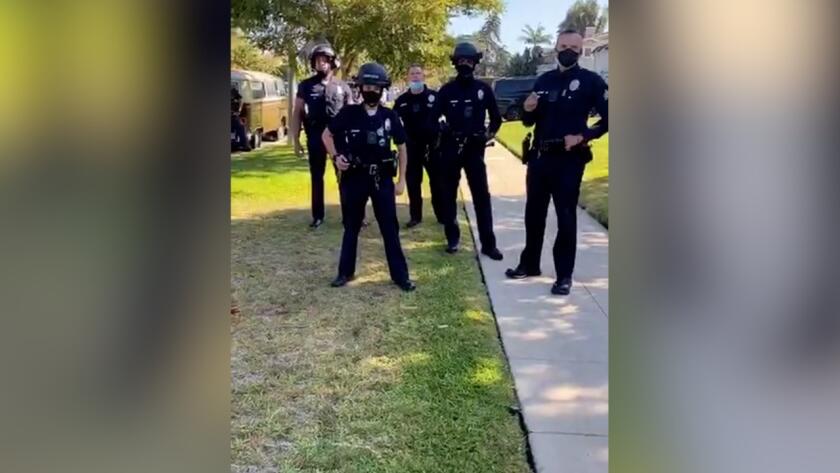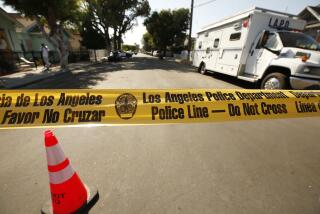Day after BLM leader announces lawsuit over ‘swatting’ incident, she’s targeted again
- Share via
Los Angeles police responded to what they later determined was a “swatting” call at the home of BLM-LA leader Melina Abdullah last year.
- Share via
Melina Abdullah, a leader of Black Lives Matter Los Angeles who filed a lawsuit this week alleging that the Los Angeles Police Department mishandled a “swatting” incident at her home last summer, was targeted with another false emergency call Thursday, according to LAPD officials.
An unknown caller purporting to be Abdullah’s young son called police Thursday morning, falsely claimed that Abdullah had overdosed on pills and requested assistance, said Capt. Stacy Spell, an LAPD spokesman.
In part because of existing concerns about false calls to the home, the department dispatched a unit along with a supervisor to Abdullah’s home to check on her, Spell said.
Spell said officers knocked on Abdullah’s door, but there was no answer. However, after a neighbor called Abdullah and alerted her to the police presence, the officers “were able to determine that she was not in any danger,” Spell said.
Melina Abdullah, co-founder of Black Lives Matter L.A., has sued the city of L.A. and the LAPD over the department’s response to a 911 call last year.
The department is now launching an investigation “into the origins of the call, understanding that this has been a location of a prior swatting incident,” Spell said.
Audio of the initial call to police was not immediately available Thursday.
Abdullah, a co-founder of Black Lives Matter-L.A. and a prominent leader of protests against police brutality in the city, said it was “very suspicious” that such a call would come the day after she announced her lawsuit over the previous incident.
“The timing is not coincidental,” she said.
Abdullah questioned whether police had knocked on her door, and why there wasn’t an ambulance sent instead of police officers if the call was for an alleged overdose.
She also said that the department’s response Thursday “demonstrates that they don’t have to respond violently with guns and assault rifles and skirmish lines and helicopters” to questionable 911 calls about prominent people like her.
Abdullah’s lawsuit against L.A. and the LAPD, filed this week in Superior Court, alleges that the department was extremely heavy-handed in its response to a false 911 call alleging a hostage situation at Abdullah’s home in August 2020, violating her civil rights in the process.
A man had called 911 and said he was holding multiple people at Abdullah’s home hostage and would kill them soon. He said he wanted to send a message that “BLM is a bunch of retards.”
Police surrounded Abdullah’s home with guns drawn until she walked outside with her hands up and told them she was fine.
Police later determined the call was a “swatting” incident, in which someone purposely calls in a false emergency in order to draw an armed response by police. Such incidents have been deadly in the past.
A man who called 911 and falsely claimed to be holding people hostage inside the L.A. home of a prominent Black Lives Matter leader told the LAPD dispatcher he was there to send a message.
Abdullah’s lawsuit alleges that the LAPD’s actions constituted unlawful seizure, false imprisonment, excessive force, assault and negligence, among other violations of her rights.
The LAPD’s Major Crimes Division launched an investigation into last year’s incident and has reached various conclusions about the caller but has yet to identify the person, Spell said.
According to the investigation, which involved multiple search warrants being served, the same person who made the swatting call on Abdullah’s home last year had called five other police agencies that day as well, “creating five additional swatting incidents across the country within a 24-hour period,” the LAPD said.
The same person is also believed to have called six police agencies, including the LAPD, the month prior, in July 2020. Other targets were in Arizona, Kansas, Missouri and New York, Spell said.
The caller used “anonymizing technologies” to hide their identity and location, including a virtual private network, or VPN, and voice over internet protocol, or VOIP, the LAPD said.
“Investigative returns show a possible nexus to a professional group of cyber hackers who use VPN’s to create anonymous overseas email accounts, and then subsequent VOIP’s to facilitate the crime by placing calls over the internet,” the LAPD said.
The LAPD said it has coordinated with the FBI on the case and is seeking more information.
The department will attempt to determine whether the same person or group was involved in Thursday’s call, Spell said.
Abdullah said the claims about a group targeting her and others across the country were “very concerning,” if true.
More to Read
Sign up for Essential California
The most important California stories and recommendations in your inbox every morning.
You may occasionally receive promotional content from the Los Angeles Times.













